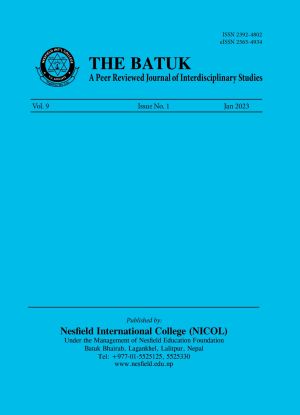Cultural Displacement in V.S. Naipaul's A House for Mr. Biswas
DOI:
https://doi.org/10.3126/batuk.v9i1.51903Keywords:
displacement, alienation, rootlessness, homelessness, nostalgia, post- colonialismAbstract
This paper examines the literary text A House for Mr. Biswas in order to explore psychological, geographical, cultural and social alienation and displacement of the migrant people. It makes exploration of how the central character, Mohan Biswas makes the search for identity based on cultural root. Displacement gives birth to the feeling of rootness. Biswas is displaced again and again exclusively as well as inclusively. The people who migrate to other countries for any reason feel the nostalgia for their homeland left behind and a feeling of fear on the strange land that gives birth to the feeling of homelessness. The text explains the difficulties and psychological anguish which create the feeling of alienation and fragmentation within a person in the colonial world. The novel attempts to reveal the hardships of the postcolonial people, endure in their search for self- identity and self-esteem in Caribbean society. V.S. Naipaul presents his experience of dislocation through the central character, who struggles for survival and feels alienated, fragmented, dislocated, and rootless. So, this research paper explores Naipaul's experience of displacement and the struggle of the protagonist in the postcolonial milieu.
Downloads
Downloads
Published
How to Cite
Issue
Section
License
This license enables reusers to distribute, remix, adapt, and build upon the material in any medium or format for noncommercial purposes only, and only so long as attribution is given to the creator.




